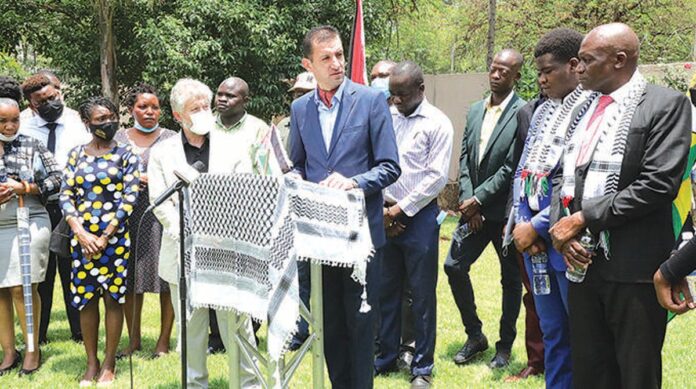Talkmore Gandiwa
A new council to coordinate all Palestine solidarity activities in the country, Zimbabwe Palestine Solidarity Council, has been launched in Harare.
The council, which comprises civic society leaders, academics, students, youth organisations and people who are in solidarity with Palestine, is a declarative platform to call upon Israel to stop its atrocities against the Palestinians.
Speaking at the launch in Harare Friday, ZPCS chairman, Kwanisai Mafa said Israel must be held accountable for crimes against humanity which it continues to perpetrate against Palestine.
“It is the responsibility of the international community to hold the Israel colonial state accountable to its crimes against humanity in occupied Palestine,” said Mafa.
Mafa said a settlement expansion was colonialism done in total defiance and flagrant disregard of international law.
He said Palestinians were being deprived of their inalienable rights and the newly formed council sought to campaign for restoration of human rights and social justice for the Palestinian people.
Mafa said the main objective of the council was to build solidarity and mutual understanding between the people of Zimbabwe and the Palestinian nation.
The council will also raise awareness in Zimbabwe of Israel occupation of the Palestinian land, the plight of its refugees and the struggle of its citizens for full equality and rights.
“The solidarity council will promote engagement with the Zimbabwe government, the political institutions in Zimbabwe for a just settlement based on the full implementation of the international law. It will also seek to develop and coordinate support for Palestine rights among political parties, the media, faith groups, local authorities and non-governmental organisations,” he said.
He added that it would also seek to foster links between Zimbabwe and Palestine institutions of economy, health, culture and promoting human and civil rights.
The council will also promote Palestinian culture, including literature, music and other arts in Zimbabwe and carry out campaigns and other educational activities.
“As of today there is no freedom of movement in Palestine, excessive force and traumatisation of children occurs on a daily basis, while homes are bombed,” he said.
The Israeli–Palestinian conflict is one of the world’s most enduring conflicts, with the Israeli occupation of the West Bank and the Gaza Strip reaching 54 years of conflict. Various attempts have been made to resolve the conflict as part of the Israeli–Palestinian peace process.
Public declarations of claims to a Jewish homeland in Palestine, including the 1897 First Zionist Congress and the 1917 Balfour Declaration, created early tension in the region. At the time, the region had a small minority Jewish population, although this was growing via significant Jewish immigration.
Following the implementation of the Mandate for Palestine, which included a binding obligation on the British government for the “establishment in Palestine of a national home for the Jewish people” the tension grew into sectarian conflict between Jews and Arabs.
Attempts to solve the early conflict culminated in the 1947 United Nations Partition Plan for
Palestine and the 1947–1949 Palestine war, marking the start of the wider Arab–Israeli conflict.
Progress was made towards a two-state solution with the 1993–1995 Oslo Accords, but today the Palestinians remain subject to Israeli military occupation in the Gaza Strip and in 165 islands across the West Bank.
The violence of the conflict, in a region rich in sites of historic, cultural and religious interest worldwide, has been the subject of numerous international conferences dealing with historic rights, security issues and human rights, and has been a factor hampering tourism in and general access to areas that are hotly contested.










